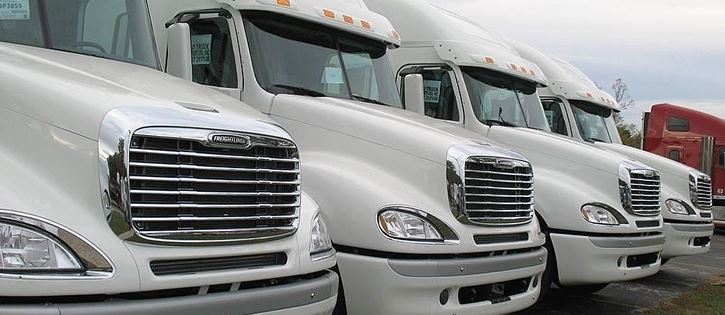What is the difference between interstate commerce and intrastate commerce?

Interstate commerce is trade, traffic, or transportation involving the crossing of a State boundary.
Either the vehicle, its passengers, or cargo must cross a State boundary, or there must be the intent to cross a State boundary to be considered an interstate carrier.
Intrastate commerce is trade, traffic, or transportation within a single State.
If your operations include interstate commerce, you must comply with the applicable Federal safety regulations and Operating Authority rules, in addition to State and local requirements. You must notify the State in which you plan to register your vehicle(s) of your intentions to operate in interstate commerce to ensure that the vehicle is properly registered for purposes of the International Registration Plan (IRP), and International Fuel Tax Agreement (IFTA). The base State will help you by collecting the appropriate fees and distributing a portion of those fees to the other States in which you operate commercial motor vehicles.
If you operate exclusively in intrastate commerce , you must comply with applicable State and local regulations. The only Federal regulations that are applicable to intrastate operations are: the commercial driver’s license (CDL) requirement, for drivers operating commercial motor vehicles as defined in 49 CFR 383.5; controlled substances and alcohol testing for all persons required to possess a CDL; and minimum levels of financial responsibility for the intrastate transportation of certain quantities of hazardous materials and substances.
Big Rig Insurance Programs: Keeping Companies Insured and On the Road
For many companies, large and small, owning a fleet of big rigs is essential for their business. As such, it’s important to ensure that these vehicles are properly insured in order to protect the company from potential financial losses. Big rig insurance programs are designed to provide comprehensive coverage for a variety of commercial vehicles, including semi-trucks, box trucks, flatbeds, and more. These policies are tailored to meet the specific needs of each business, providing the necessary protection to keep companies on the road and profitable.
What Is Big Rig Insurance?
Big rig insurance is an insurance policy designed specifically for commercial vehicles like semi-trucks and box trucks. These policies typically cover liability, property damage, medical payments, uninsured motorist coverage, cargo coverage, and other types of protection. The cost of a big rig insurance policy will vary depending on the type of vehicle being insured and the type of coverage needed. Many companies opt for a comprehensive policy that covers all possible risks associated with operating a commercial vehicle.
What Are The Benefits Of Big Rig Insurance?
There are numerous benefits associated with having a big rig insurance policy in place. First and foremost, these policies provide peace of mind knowing that your business is protected against any potential financial losses due to an accident or other incident involving one of your vehicles. Additionally, big rig insurance can help you avoid costly repairs if one of your vehicles is damaged in an accident or incident. It can also help cover medical expenses if someone is injured while operating one of your vehicles. Finally, big rig insurance can help you stay compliant with state laws regarding commercial vehicle operation and can even provide discounts on premiums if you have multiple vehicles covered under one policy.
What Types Of Coverage Are Available?
The types of coverage available with a big rig insurance policy will vary depending on the insurer and the specific needs of your business. Commonly offered coverages include liability (which covers damages caused by your vehicle), property damage (which covers damages caused to another person’s property), medical payments (which covers medical expenses related to an accident), uninsured motorist coverage (which covers damages caused by an uninsured driver), cargo coverage (which covers damage or loss to cargo being transported by your vehicle), and more. Depending on your insurer, you may also be able to purchase additional coverages such as roadside assistance or rental reimbursement coverage.
Differences Between Intrastate vs Interstate Operation
Intrastate operation involves operating a commercial vehicle within a single state while interstate operation involves operating across state lines. Both intrastate and interstate operations require special permits in order to be legal; however, there are some key differences between them that must be taken into consideration when selecting an appropriate big rig insurance policy:
• Intrastate operations usually involve shorter distances than interstate operations; as such, intrastate policies tend to be less expensive than interstate policies
• Intrastate policies typically only cover damages caused within the state in which they are purchased; however, interstate policies often offer broader coverage that extends beyond state lines
• Intrastate policies may not offer certain types of coverage such as cargo or rental reimbursement; however, interstate policies often do
• Intrastate policies may not provide certain benefits such as roadside assistance or discounts on premiums; however, interstate policies often do
• Intrastate operations typically require less paperwork than interstate operations; as such, intrastate policies tend to have simpler requirements for obtaining coverage
• Interstate operations usually involve crossing state lines; as such, these policies must adhere to regulations imposed by both states involved in the operation
• Interstate operations may require additional permits or licenses depending on which states are involved in the operation
Big rig insurance programs provide essential protection for businesses that own fleets of commercial vehicles like semi-trucks and box trucks.
These programs offer comprehensive coverage tailored to meet the specific needs of each business while helping them stay compliant with state laws regarding commercial vehicle operation. Additionally, understanding the differences between intrastate vs interstate operation can help businesses select the right type of policy for their needs while ensuring they remain protected against any potential financial losses due to an accident or incident involving one of their vehicles.
https://www.transportation.gov/faqs/default.aspx